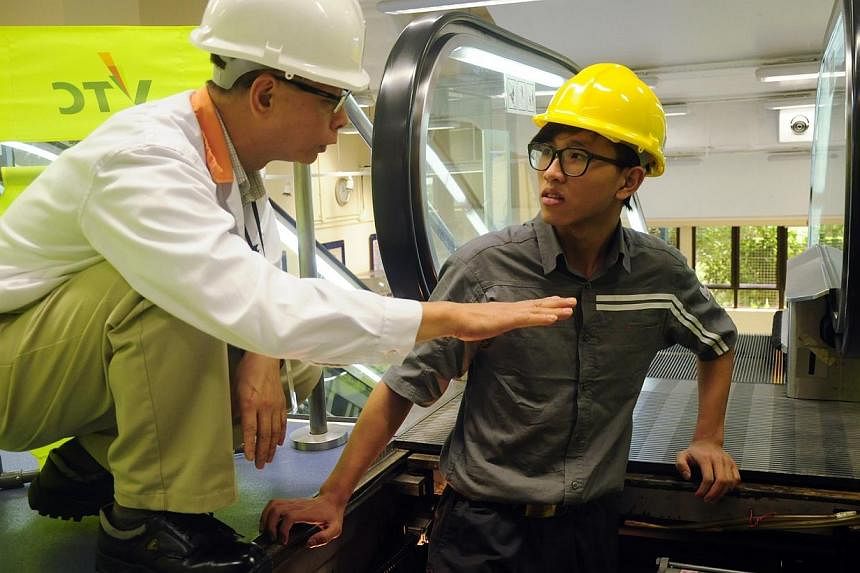The Prime Minister's National Day Rally speech on Sunday was not an annual report delivered by the chief executive officer of some commercial entity.
It was full of heart and soul, undergirded by a sense of informed realism about what it will take for Singaporeans to see their lives improve and the nation prosper.
Stories of three Keppel Offshore and Marine employees anchored the idea of hope.
Mr Lee Hsien Loong said Singapore should be a place where an individual's merit - or lack thereof - at ages 16, 18 or 25 will not prejudice his or her chance of progress in later life.
Mr Lee pledged that his Government would ensure that performance and contribution would draw their own rewards.
Deputy Prime Minister Tharman Shanmugaratnam had coined the term "continuous meritocracy" to refer to a system where a worker can progress on merit, regardless of his initial qualification. When increasing numbers of Singaporeans find that this is true, the common criticism that "meritocracy" is really only a fig leaf for "elitism" in Singapore will be debunked.
The desire to provide hope that "anyone can improve his life if he works hard" and that opportunities to upgrade will remain open throughout one's career is reflected in the Government's effort to level up the vocational education track from being a poorer cousin to the academic one, to one that is on par with it.
The Government is about to give greater traction to this commitment. Mr Lee said that Mr Tharman, a former education minister, is to head the effort to implement the recommendations of the Applied Study in Polytechnics and ITE (Aspire) committee, tasked to review tertiary technical education.
At a seminar held by the Institute of Policy Studies (IPS) with Swiss think-tank Avenir Suisse in October last year, participants learnt that the education and training system in Switzerland is guided by the principle of "permeability".
Swiss youth and workers - recognised for making up a world- class workforce known for its productivity, innovation and creativity - are able to toggle between three different paths through their lifetimes.
These paths are the baccalaureate system that leads to university; the upper secondary specialised school system that leads to training for specific professions like teaching; and the vocational education and training track that incorporates career-shaping apprenticeship programmes.
People on the third track are not severely disadvantaged by way of pay or career progression compared to the others. They also enjoy as much high standing in the sectors they are found in as the people who have taken the other two tracks.
One Singaporean commentator, ITE College principal Ang Kiam Wee, said that the three "Ps" - pay, progression and pride - had to be addressed to make a system like the Swiss one a reality in Singapore.
Perfect parity between the vocational and academic tracks may be difficult to attain. But with the blurring of lines through the mainstreaming of practice-oriented degree studies in our universities on the upside, and sadly, the degree inflation that is taking place in the more "popular" academic courses globally on the downside, trends in the world of work may close that gap.
What must also change is the Singaporean practice of human resource management or talent management. The practice of performance appraisal, the development of all manpower as talent, and the ability to integrate talent from all backgrounds - vocational, academic, degree holders and non-degree holders - must also be sharpened.
At an IPS Corporate Associates meeting last month, a leading human resource practitioner, Ms Karen Cariss, explained that the old Western talent management rule of 70/20/10, in which 70 per cent of skills development comes from on-the-job experience, 20 per cent from feedback and 10 per cent from formal training, should be replaced. In younger, dynamic Asian settings, the emphasis should be 50 per cent from skills development expected from on-the-job training, 30 per cent from feedback and 20 per cent from formal training.
Past surveys suggest that human resource and management practices between multinational firms and local ones based in Singapore can be very different but they can all be improved upon.
Improvements should be made in the areas of structured programmes to ensure that on-the-job learning is effective, and that mentoring provides precious guidance for career development and effective integration of one's workforce as mentioned above.
This will give meat to the "cultural change" that allows Singapore to transcend the mind-forged manacles that hold other societies back.
There is no right caste, class or race that you have to be born into to succeed in Singapore; nor might past infirmities or disability stop you.
Dr Gillian Koh is a senior research fellow at the Institute of Policy Studies researching politics and governance in Singapore.

